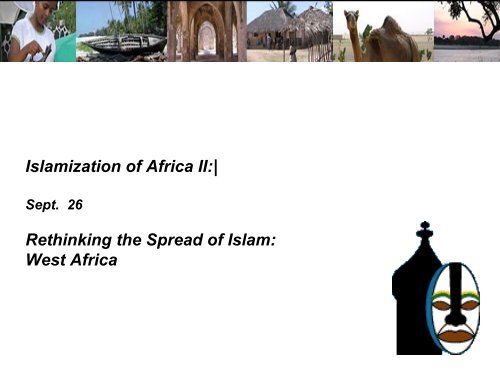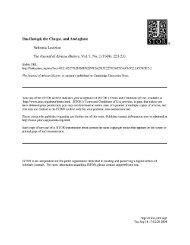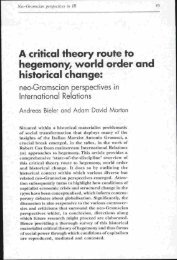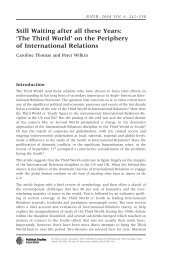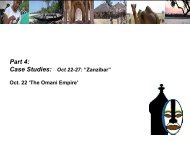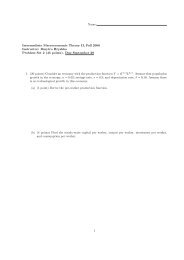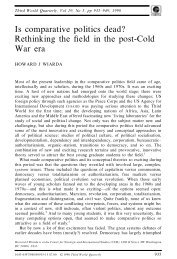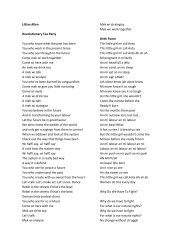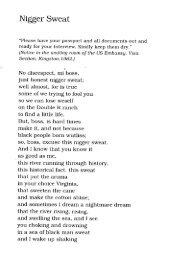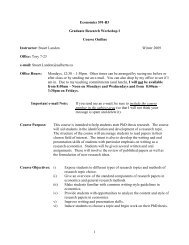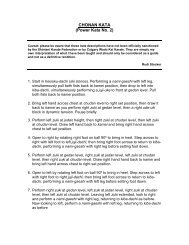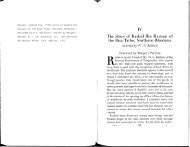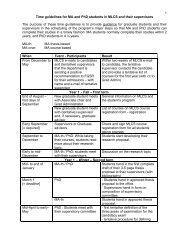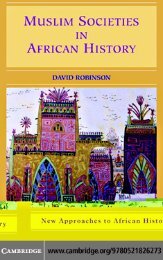Islamization of Africa II:| Rethinking the Spread of Islam: West Africa
Islamization of Africa II:| Rethinking the Spread of Islam: West Africa
Islamization of Africa II:| Rethinking the Spread of Islam: West Africa
- No tags were found...
Create successful ePaper yourself
Turn your PDF publications into a flip-book with our unique Google optimized e-Paper software.
<strong><strong>Islam</strong>ization</strong> <strong>of</strong> <strong>Africa</strong> <strong>II</strong>:|Sept. 26<strong>Rethinking</strong> <strong>the</strong> <strong>Spread</strong> <strong>of</strong> <strong>Islam</strong>:<strong>West</strong> <strong>Africa</strong>
<strong>Spread</strong> <strong>of</strong> <strong>Islam</strong> Into <strong>Africa</strong>:7th-19th C.Almoravids 11 th C.7 th -15 th centuriesArab andSwahilitraders spread<strong>Islam</strong>: 8th-19thcenturies C.E.
<strong>Islam</strong> and Trade“<strong>Islam</strong> and Trade in <strong>the</strong> Bilad al-Sudan,Tenth-Eleventh Century A.D.”Michael Brett (1983)Very important argument for ‘spread <strong>of</strong> <strong>Islam</strong> intoSahara/<strong>West</strong> <strong>Africa</strong>’:- while focusing on ‘trade’, unlike most arguments, isnot interested in trade-routes- does not assume ‘<strong>Islam</strong>’ follows tradeRa<strong>the</strong>r, explains why it does in terms <strong>of</strong> <strong>Islam</strong>ic Law
<strong>Islam</strong> and TradeKey Question:What constitutes <strong>Islam</strong>ic Law in context <strong>of</strong> trans-Saharan and sub-Saharan trade/settlement?- Brett argues <strong>the</strong> connection between ‘<strong>Islam</strong>’ and ‘trade’so <strong>of</strong>ten invoked in historical research was ‘law’
<strong>Islam</strong> and Trade- merchants spent time in bilad al-Sudan (‘land <strong>of</strong> <strong>the</strong>blacks’)- when <strong>the</strong>y stayed <strong>the</strong>re for very long periods and/ordied <strong>the</strong>re: issues arose around inheritance,credit/collection <strong>of</strong> debts.- qadis (judges) and ‘jurists’ in North <strong>Africa</strong> called uponto issue fatawa (judgments)- <strong>Islam</strong>ic law began in this way to shape ‘sub-Saharan’commerce and society
<strong>Islam</strong> and Trade- system <strong>of</strong> jurists to assist in implementation <strong>of</strong> law inplace by late 9 th c.- by early 11 th c., litigation generated by ‘trans-Saharan’affairs was normalBrett :- ‘trade’ does not, in itself ‘convert’ [as we saw in East <strong>Africa</strong>,Ethiopia]- merchants’ needs determined by living outside dar al-<strong>Islam</strong> (‘land <strong>of</strong> <strong>Islam</strong>’), shape practice <strong>of</strong> <strong>Islam</strong> as it‘moves into’ <strong>the</strong> Sudan
<strong>Islam</strong> and TradeBrett presents two cases :(I) Trader took goods on credit from North <strong>Africa</strong>nmerchant (Ifriqiya): intent to trade in Tadmakka[see Ibn Battuta, Additional Readings, ‘Walata’]- <strong>Islam</strong>ic contract stipulated terms: pr<strong>of</strong>it sharing, when/where itwould take place- [instead <strong>of</strong> staying in tadmakka], trader continued on to Walata and<strong>the</strong>n to major trans-Saharan terminus <strong>of</strong> Awdaghust where hestayed 11 years- accumulated enough debts that local creditors demandedrepayment- North <strong>Africa</strong>n merchant argued he should be included in ‘creditors’Case turned over to (Moroccan) Jurist for judgment.
<strong>Islam</strong> and Trade(<strong>II</strong>) Wealthy merchant (North <strong>Africa</strong>n) died in Sudan(town in which death occurred not specified –thought to be Awdaghust):- his family appointed someone to deal with his affairs (warehousedmerchandise, contracts, local agreements)- local Muslim community protested that person to do this should be<strong>the</strong> nazir : person appointed by region’s ‘King’ to be intermediarybetween non-Muslim State and local Muslim CommunityCase referred to (same Moroccan) Jurist forjudgment.
Trans-SaharanTradeCentresinvolved inCases 1 & 2<strong>Islam</strong> and Trade
<strong>Islam</strong> and TradeWhat does Brett draw from each Case?What is important to us?Case I:Jurist rejected claim <strong>of</strong> merchant based on “<strong>Islam</strong>iccontract” (his argument) but supported on concept <strong>of</strong>“delayed repayment”:
<strong>Islam</strong> and Trade- ruled that bilad al-Sudan was ‘not trustworthy’ and<strong>the</strong>refore any ‘<strong>Islam</strong>ic contract’ that extended into <strong>the</strong>Sudan was not ‘good’- merchant had entered into ‘risky’ contract for which hehad to accept ‘risks’- reasoning supports Fisher’s argument [“Almoravids”]that <strong>the</strong> Sahara and ‘lands beyond’ were considered as‘physically and conceptually distant’ for Ifriqiya as forEgypt/Arabia
<strong>Islam</strong> and TradeBUT: Jurist determined key element was ‘repaymentschedule’:- trader agreed to timetable (and pr<strong>of</strong>it sharingirrespective <strong>of</strong> ‘where’) and had violated that agreement- Merchant entitled to be ‘creditor’ amongst o<strong>the</strong>rs inAwdaghust
<strong>Islam</strong> and TradeGives idea <strong>of</strong> how <strong>West</strong> <strong>Africa</strong> was ‘seen’ in MuslimWorld (even from as close as North <strong>Africa</strong>) in early11 th century:-also shows how <strong>Islam</strong> slowly became part <strong>of</strong> <strong>West</strong><strong>Africa</strong>n society through ‘trade’ issues, even when‘<strong>Islam</strong>ic’ contracts were not seen as being valid- reinforces understanding that ‘trade’ was worthtremendous risk and <strong>Islam</strong>ic Law was trying to(‘legitimately’) underpin risk
<strong>Islam</strong> and TradeCase 2:Jurist supports claim <strong>of</strong> local Muslim communityagainst family:- Malike law argues that ANY state is better than none- Muslims need to live within a state structure so that<strong>Islam</strong>ic law (which governs <strong>Islam</strong>ic life) can be exercised
<strong>Islam</strong> and Trade- system <strong>of</strong> appointing ‘Muslim intermediary (nazir)’ tonegotiate, communicate between ‘state’ and ‘community’well established- not desirable but because Muslim traders found itnecessary to live beyond dar al-islam, needed to berespected- in this case, appointment <strong>of</strong> ‘pagan King’ (nazir) tookprecedence over family wishes
<strong>Islam</strong> and TradeBrett’s examples give clear understanding <strong>of</strong> linkagebetween notion <strong>of</strong> ‘necessity <strong>of</strong> a state/governancestructure’ and successful spread <strong>of</strong> sunni <strong>Islam</strong> andMalike law (into <strong>West</strong> <strong>Africa</strong>):- shaped Muslims’ acceptance <strong>of</strong> ‘negotiation’ and‘compromise’ with <strong>West</strong> <strong>Africa</strong>n states- made it possible for Muslims to live ‘<strong>the</strong> good life’ (living<strong>the</strong> values <strong>of</strong> <strong>Islam</strong>) in ‘pagan’ lands
<strong>Islam</strong> and Trade[Brett, citing <strong>the</strong> judgement]“ It is <strong>the</strong> division established by <strong>the</strong> Arab conquest <strong>of</strong> Egypt and North<strong>Africa</strong> between countries where Muslims rule, and <strong>the</strong> Law <strong>of</strong> <strong>Islam</strong>prevails… and those where this state <strong>of</strong> affairs, divinely ordained for<strong>the</strong> good life, does not exist. Instead <strong>the</strong>re is….opposition, a state inwhich <strong>the</strong> Law is not accepted… . For Muslims to venture into thisregion is perilous; <strong>the</strong>y risk being unable to live according to <strong>the</strong>Law, thus falling into <strong>the</strong> same state <strong>of</strong> contravention [as <strong>the</strong> peoples<strong>of</strong> that land], which in <strong>the</strong>ir case is sin. Never<strong>the</strong>less <strong>the</strong>y do so inorder to trade, and it is <strong>the</strong> duty <strong>of</strong> <strong>the</strong> jurist to provide <strong>the</strong>m asfar as possible with <strong>the</strong> protection <strong>of</strong> <strong>the</strong> Law as <strong>the</strong>y traveloutside <strong>the</strong> lands where it can be properly enforced. …
<strong>Islam</strong> and TradeBrett concludes that <strong>the</strong> growth trade and <strong>Islam</strong> south<strong>of</strong> <strong>the</strong> desert proves <strong>the</strong> success <strong>of</strong> this ‘system’ :“[<strong>the</strong>] application <strong>of</strong> universal rules allowed <strong>the</strong> Muslim merchant toenter <strong>the</strong> particular society <strong>of</strong> <strong>West</strong> <strong>Africa</strong> with its multiplicity <strong>of</strong>customs and laws. For this it provided him with a recognized identityapart from <strong>the</strong> peoples with whom he traded. Thereby it gave riseto resident Muslim communities , which ipso facto formed part<strong>of</strong> this Sudanese society…The formation <strong>of</strong> distinctcommunities, and <strong>the</strong>ir insertion into <strong>the</strong> complicated pattern <strong>of</strong><strong>West</strong> <strong>Africa</strong>n society, all on <strong>the</strong> basis <strong>of</strong> <strong>the</strong> <strong>Islam</strong>ic Law and itsprovisions for <strong>the</strong> conduct <strong>of</strong> daily life, were features whichsurvived <strong>the</strong> transition to <strong>Islam</strong> as a religion <strong>of</strong> <strong>the</strong> Sudanese<strong>the</strong>mselves”
<strong>Islam</strong> and TradeBrett Raises two additional issues:1. Conversion-- because <strong>the</strong> system gave a Muslim an ‘identity ‘apart’,he may have been ‘isolated’ locally: “this merchant’s<strong>Islam</strong> may have produced few converts”- this assumes ‘conversion’ was main way in which<strong>Islam</strong> ‘spread’
<strong>Islam</strong> and TradeBut Returning to Case (1):- merchant “went to Tadmakka [as agreed by <strong>the</strong>contract], but <strong>the</strong>n went on to Ghana and Awdaghust,where he married and had children, and stayedeleven years…”
<strong>Islam</strong> and TradeStory suggests:- Merchant settlers “married”: took local <strong>West</strong> <strong>Africa</strong>ns aswives (or possibly concubines)- “had children”: who would have been raised Muslim- process created ‘Muslim community’ which over time,added its own (Muslim) women as prospective wivesavailable to merchants- even if Merchant returned to North <strong>Africa</strong> after 11years, clear that ‘family’ remained in Awdaghust[worth comparing in several aspects to East <strong>Africa</strong>]
<strong>Islam</strong> and Trade2. The Role <strong>of</strong> <strong>the</strong> State- Brett raises question: “What happens when Muslimslive in ‘pagan lands’ without a state?”- Answer: “<strong>the</strong>y had to create one”.- eg. in Case (2): nazir allowed Muslims to ‘live <strong>the</strong> goodlife’ within <strong>the</strong> framework <strong>of</strong> ‘pagan state’
<strong>Islam</strong> and TradeLeads him to ‘explain’, evaluate Almoravids [Sept 24and below] in new ways:- if Muslim scholars measured ‘being Muslim’ by <strong>the</strong>extent <strong>of</strong> <strong>the</strong> application <strong>of</strong> <strong>Islam</strong>ic Law – which in turnrequired societal base <strong>of</strong> a ‘state’:by definition, Saharan Sanhaja who lived by tribalcustom and were lawless --were ‘pagan’, eventhough <strong>the</strong>y considered <strong>the</strong>mselves to be Muslim.
<strong>Islam</strong> and Trade- <strong>the</strong>n: Ibn Yasin launched jihad not to punish or toconvert but to create <strong>Islam</strong>ic State which would properlyallow <strong>the</strong> application <strong>of</strong> ‘Law’ and <strong>the</strong>reby <strong>the</strong> possibilityfor Muslims to live ‘<strong>the</strong> good life’.
<strong>Islam</strong> and TradeBrett notes:- after establishing ‘state’ in desert, Almoravids moved toattack Awdaghust (1053-54)- according to Arabic texts, this was because: “Muslimshere accepted <strong>the</strong> authority <strong>of</strong> <strong>the</strong> ‘pagan King <strong>of</strong>Ghana’”- but following <strong>the</strong> logic <strong>of</strong> <strong>the</strong> North <strong>Africa</strong>n jurist in hisruling (Case 2): Ibn Yasin was wrong to seeAwdaghust’s Muslims as living in sin
<strong>Islam</strong> and TradeConclusion important:- nature <strong>of</strong> Muslims’ relationships with ‘pagan’regions/kings became moot with establishment between11 th and 15 th centuries <strong>of</strong> series <strong>of</strong> <strong>Islam</strong>ic states across<strong>West</strong> <strong>Africa</strong>n desert-edge.-BUT it re-emerged in late 18 th and 19 th centuries in(sub-Saharan) <strong>West</strong> <strong>Africa</strong> as jihads were launchedagainst ‘less-<strong>the</strong>n-fully-Muslim’ states –justifying<strong>the</strong>mselves much as <strong>the</strong> Almoravids had centuriesearlier.[we will look at one <strong>of</strong> <strong>the</strong> most significant, Sokoto, in ‘Case Studies’]
‘Conquest that never was…’The Almoravids, Ancient Ghana and ‘<strong>the</strong> conquest thatnever was’:- text Brett cites [above] leads into ‘founding narrative’ <strong>of</strong><strong><strong>Islam</strong>ization</strong> <strong>of</strong> <strong>West</strong> <strong>Africa</strong>- (said that) following <strong>the</strong> sacking <strong>of</strong> Awdaghust, <strong>the</strong>Almoravids went on to ‘conquer’ <strong>the</strong> pagan state itself,Ancient Ghana, in 1076 and establish an <strong>Islam</strong>ic state- <strong>Islam</strong> came to <strong>West</strong> <strong>Africa</strong> ‘by <strong>the</strong> sword’
Ancient GhanaAwdaghust:Trans-SaharanCommercialCentre. .Kumbi Saleh:Capital <strong>of</strong>Ancient Ghana
‘Conquest that never was…’“The Conquest that Never Was. Ghana and <strong>the</strong>Almoravids 1076.- Pt. I ‘<strong>the</strong> written sources.- Pt. <strong>II</strong> ‘<strong>the</strong> oral sources”David C. Conrad, Humphrey J Fisher (1983)Possibly <strong>the</strong> most important (two-part) article for forcinghistorians to re-evaluate <strong>the</strong> history <strong>of</strong> <strong>Islam</strong> in <strong>West</strong><strong>Africa</strong>, as well as <strong>the</strong> sources we use to write that history
‘Conquest that never was…’Fisher: ‘<strong>the</strong> written sources” [Arabic accounts]- contemporary written sources, late 11 th & 12 thcenturies, were ‘silent’ on such a conquest- one states only that “in 1076, Ghana became Muslim”- first mention <strong>of</strong> ‘conquest’ was 14 th century account:three centuries later
‘Conquest that never was…’Conrad: ‘<strong>the</strong> oral sources’ [local oral traditions]- he examined ‘Sudanese’ oral traditions: legends, epicspassed down through generations by griots [‘oral’historians]- in local traditions, name ‘Ghana’ not used: knownra<strong>the</strong>r as ‘Wagadu’ and ‘Kumbi’- Wagadu founding tradition: ruin <strong>of</strong> <strong>the</strong> state associatedwith slaying <strong>of</strong> gigantic snake, Bida, whose severedhead delivers a ‘curse’ on Wagadu
‘Conquest that never was…’Some have argued this represents a criticalhistorical ‘moment’:- breaking with traditional, ancestral religion- adopting <strong>of</strong> <strong>Islam</strong>- equals overlay <strong>of</strong> ‘written’ sources and ‘conquest<strong>the</strong>ory’[eg Nehemia Levtzion, Ancient Ghana and Mali – classic text onsubject]
‘Conquest that never was…’Conrad rejects:- cannot associate oral chronicle (‘legendary events) withwritten narrative (<strong>Islam</strong>ic ‘dates’)- worked with 17 versions <strong>of</strong> <strong>the</strong> legend:- few ‘oral’ (recorded by Conrad with local griots),- most written (few before 1900, most between1900-25, 1950-75)-drawn from several different ethnic groups/regions[presents methodological challenges similar to those encounteredin East <strong>Africa</strong>]
‘Conquest that never was…’Conrad concludes:- oral record silent on any conquest, let alone specific‘<strong>Islam</strong>ic/Almoravid’ conquest- destruction <strong>of</strong> Wagadu as ‘<strong>the</strong>me’ is present – evendominant, in many versions <strong>of</strong> legend
‘Conquest that never was…’“All versions agree that a drought and ensuing famine wereresponsible for <strong>the</strong> ruin <strong>of</strong> <strong>the</strong> nor<strong>the</strong>rn regions <strong>of</strong> Wagadu, and for<strong>the</strong> destruction <strong>of</strong> Kumbi [<strong>the</strong> captial]. That <strong>the</strong> Soninke [dominantethnic group] <strong>of</strong> Wagadu were highly conscious <strong>of</strong> <strong>the</strong>ir dependenceon adequate rainfall for <strong>the</strong> security and prosperity <strong>of</strong> <strong>the</strong>ir land isreaffirmed. As is common in foundation tales from semi-arid regions<strong>of</strong> west <strong>Africa</strong>, <strong>the</strong> traditional explanation <strong>of</strong> <strong>the</strong> founding <strong>of</strong> Wagaduemphasizes <strong>the</strong> importance <strong>of</strong> an abundant water supply…”Conrad: <strong>the</strong> ‘momentous event’ that may be hidden in <strong>the</strong>metaphor <strong>of</strong> Bida bringing a curse upon <strong>the</strong> land was not<strong>the</strong> ‘curse’ <strong>of</strong> <strong>Islam</strong> but that <strong>of</strong> long-term drought
‘Conquest that never was…’Conrad adds references to later written texts tosupport argument:1. 1898 Sudan account [written] in which it is recountedthat a Soninke ancestor, Dinga, purchased <strong>the</strong> power tocommand rain- in late 19 th century, his descendants were claimingto have inherited this power [for political reasons]
‘Conquest that never was…’2. in 19 th C. writings <strong>of</strong> jihad leader Nor<strong>the</strong>rn Nigeria[our Sokoto Case Study], <strong>the</strong>re is reference to 17 th centuryTimbuktu scholar, Ahmad Baba[scholar important in Robinson’s discussion <strong>of</strong> ‘Slavery’ ; next week]:[19 th c <strong>Islam</strong>ic leader] “If you ask whe<strong>the</strong>r <strong>the</strong> Muslims among <strong>the</strong>people <strong>of</strong> <strong>the</strong> Sudan accepted <strong>Islam</strong> through being conquered orwhe<strong>the</strong>r <strong>the</strong>y pr<strong>of</strong>essed it voluntarily, I would say that <strong>the</strong> answer tothis is as was stated by Shaykh Ahmad Baba … : ‘They accepted<strong>Islam</strong> without being conquered by anybody.’ In ano<strong>the</strong>r place hesaid: ‘It appears from what Ibn Khaldun and o<strong>the</strong>rs said thatthose who became Muslims from among <strong>the</strong> Sudanese did sovoluntarily without being conquered by anybody’.
‘Conquest that never was…’“The View From Awdaghust: war, trade andsocial change in <strong>the</strong> Southwestern Sahara…”E. Ann McDougall (1985)- by early 1980s, archaeological material available* onAwdaghust to add to <strong>the</strong> written accounts and oralliterature- also substantial anthropological work on ‘pastoralism’ ingeneral*[most had not yet been published; I was provided with original<strong>the</strong>ses]
‘Conquest that never was…’Main arguments:1. Pastoralism:- Almoravids camel-raising nomads- unlikely to ‘settle’ in sahel environment like Ghana- animals could not live year-round in sou<strong>the</strong>rn diseaseenvironment- at best ‘seasonal visitors’ (eg. to trade, raid)
‘Conquest that never was…’2. Archaeological Evidence: Awdaghust site- ‘settlement layers’ show ongoing occupation, nosignificant reduction in physical settlement until three-t<strong>of</strong>ourcenturies later- some indication drying conditions over long-term meantcity no longer sustainable: gradually shrunk, finallyabandoned*- archaeology supports <strong>the</strong> Conrad-Fisher ‘reading’ <strong>of</strong>oral and written records that indeed, ‘<strong>the</strong> conquestnever was…’[same evidence shows a ‘re-settlement’ <strong>of</strong> smaller dimensions in 17 th c,part <strong>of</strong> new commercial growth in region]
Empire and <strong>Islam</strong>Following decline state <strong>of</strong> Ghana: series <strong>of</strong> <strong>Islam</strong>icstates rose across <strong>West</strong> <strong>Africa</strong>n Sahel :- Mali (direct successor, former province <strong>of</strong> Ghana)[13 th –14 th C.]- Songhay (following on Mali) [15 th -16 th C.]- Kanem-Bornu [15 th )- Hausaland (‘confederacy’ <strong>of</strong> states) [Muslimbeginning 15 th -16 th C.]
Ancient Mali:successor toGhana<strong>Spread</strong> <strong>of</strong> <strong>Islam</strong> Into <strong>Africa</strong>:
<strong>Spread</strong> <strong>of</strong> <strong>Islam</strong> Into <strong>Africa</strong>:Songhay:Successor toMaliHausaland,Kanem-Bornu[No<strong>the</strong>rnNigeria –Chad]HausaStatesKanem- still powerfulin 19 th century
Ibn Battuta, Mali and <strong>Islam</strong>Walata[Discussion Reading, Friday Sept. 28]Ibn Battuta, Morocco(1304 – 1368)


